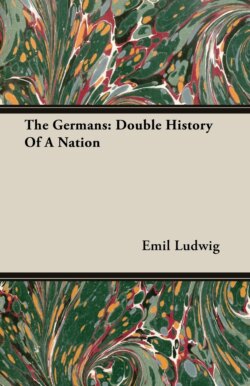Читать книгу The Germans: Double History Of A Nation - Emil Grimm Ludwig - Страница 16
На сайте Литреса книга снята с продажи.
2
ОглавлениеIN THE course of the Middle Ages the struggle between the German spirit and the State was revealed in three great movements. Pope fought emperor; commoner fought nobleman; minstrel fought knight. After seven hundred years of tremendous struggle the clouds parted around the year 1500, and for a moment the sun of the spirit scattered the fog with its radiance. Like gods of antiquity, Liberty and Art appeared up in the empyrean. Then the gray curtain of clouds closed again, and not until three hundred years later was there a second glimpse of the spirit. In each of the three movements one man rose head and shoulders above the general run of important figures, his stature outlasting the welter of struggle. The minstrel was Walther von der Vogelweide; the commoner Gutenberg; and in the struggle between Church and emperors too there was but one, Frederic II of the House of Hohenstaufen, who ruled by virtue of the spirit.
The entire German Middle Ages seem like a tragedy. If in this overture the themes of the great tragic opera, later called the German Middle Ages, are anticipated, it is a minor key to which we listen for the most part. The radiant, serene or elegant themes that interrupted the contemporary struggle in other countries—these we shall hear but rarely. The German character harmonized perfectly with the problems of the Middle Ages; the inchoate strivings and mystic violence of both are closely related, and for this very reason the Germans then aspired to lead the world—and succeeded, at any rate, in leading the world’s unrest. That is why they constantly hark back to the Middle Ages and, today again as then, seek to found their rule upon the dual elements of violence and the spirit. But the spirit has meanwhile evaporated.
In no other epoch does the dual nature of the German soul emerge more attractively than in the Middle Ages. The elements were then not yet so sharply divided as they were later. There were still weapons on both sides and thoughts on both sides, and because of them the three-hundred-year struggle between the emperors and the Popes remained inconclusive. Both raised ideas as well as swords against each other and both revealed the secret desire of the German always to give a philosophical rationalization to his elemental urges. World dominion as aspired to by the German emperors had to be given a moral excuse; the boundless will for expansion had to be fortified with Faustian motives. The ermine of power had to be lined with the silk of mystic thought.
These qualms of conscience even then cheated the Germans out of the simple enjoyment of their conquests. If nothing else excluded them from world dominion, it was this inner feeling of insecurity, expressed in the great migrations by their ready assimilation, in the Middle Ages by their moral justification of ambitious and avaricious purposes. The Frenchmen too had ulterior motives for the Crusades; and the British even today grandiloquently call their conquests missions in the name of Christianity. But the Germans were and still are the only ones in this shadow play to believe in their own pretexts, because, more romantic than naïve, they have inherited the methods but not the serenity of the ancients. The Italian, the most natural person in the world, knows precisely when he is putting on an act; the German is never aware of it. It is this that even today sets the Germans apart from Machiavelli and from Nietzsche, whose authority they are so fond of invoking. They lack inner freedom. The moral pressure under which these naturally violent people have lived since their conversion to Christianity seems to have awakened secret doubts within them.
Had the will to world dominion led the German emperors eastward, had the Pope resided on the Vistula instead of the Tiber, the Germans might have prevailed more decisively; they might even have won out in the end. This is proved by the vast conquests in the East they actually made in those same centuries. But their nobles, like their ancestors before them, were lured from those wild and yawning lands to the South where they not only enjoyed fertility and sunshine but also sensed a serene spirit that was denied them. When the German emperors went to Rome to attain the imperial crown of world dominion, there went with them the desire for the unattainable. They felt themselves drawn to peoples who in the past, even in decadence, had shown spiritual superiority over their conquerors. But this romantic urge, instead of gaining them world power, cheated them of it.
